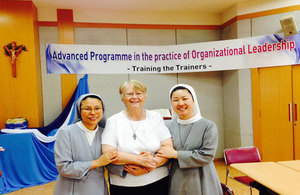Holy See: Training women leaders
Our Ambassador Sally Axworthy reflects on the work of Sister Christine Anderson in celebration of International Women's Day.

Sister Christine Anderson is a counsellor and organisational analyst, and the Director of Faith and Praxis for Global Leadership, an organisation that develops the leadership skills of religious women, men and lay people. A Scot, Sister Christine is a member of the Congregation of the Faithful Companions of Jesus, which follows the spirituality of St Ignatius Loyola.
Sister Christine joined the order after leaving school, studied mainly in Friburg, and then taught modern languages in a big London comprehensive and worked as national training officer of a Christian worker movement. As a teacher she became interested in working with parents to support their children, which led her to study Ignatian spirituality in Rome and work as pastoral assistant in the Westminster diocese. After a stint studying theology, she set up the Craighead Institute in Glasgow to train lay people for service to the poor. The Institute had a strong international dimension, working with the Jesuit Refugee Service in Croatia Bosnia, Africa and Asia.
When the government of Lithuania handed back to the Jesuits in the 1990s a school that they had once run, Christine was part of a team sent out to repair the damage to staff cohesion as communism fell apart. She and her colleagues founded another Institute and visited often to train the staff. She was inspired by the commitment to Christianity she found there demonstrated for example in the Bible translated into Lithuanian and written out by hand.
In 2003 Christine moved to Rome to work as human resources officer in the Curia for two years, then founded Faith and Praxis to train leadership teams for organisations resident in Rome and serving throughout the world. The training is based on discernment (analysis, advice-taking, prayer and reflection as the grounds for decision-making), the social teaching of the church and systemic and organizational analysis.
Christine tells me that the Faithful Companions of Jesus focus their work on the poor, those who have fallen into the crevices of society. They fight trafficking and poverty, providing counselling and doing pastoral work. She says that by their nature religious congregations are on the periphery of society, commited to the Church but outside of the hierarchical structures.
Christine’s story seems to illustrate the freedom that the religious orders were able to give to women to use their initiative, particularly before the changes in the role of women of recent decades. In the Christian worker movement Christine saw needs for working with the laity in their role as Christian citizens in society, and for the training of leadership teams. With the support of her order, was able to set up Institutes to meet those needs.
Discerning needs and doing something about them: the religious orders’ strength!
Sally Axworthy, British Ambassador to the Holy See
Follow @SallyAxworthy on Twitter